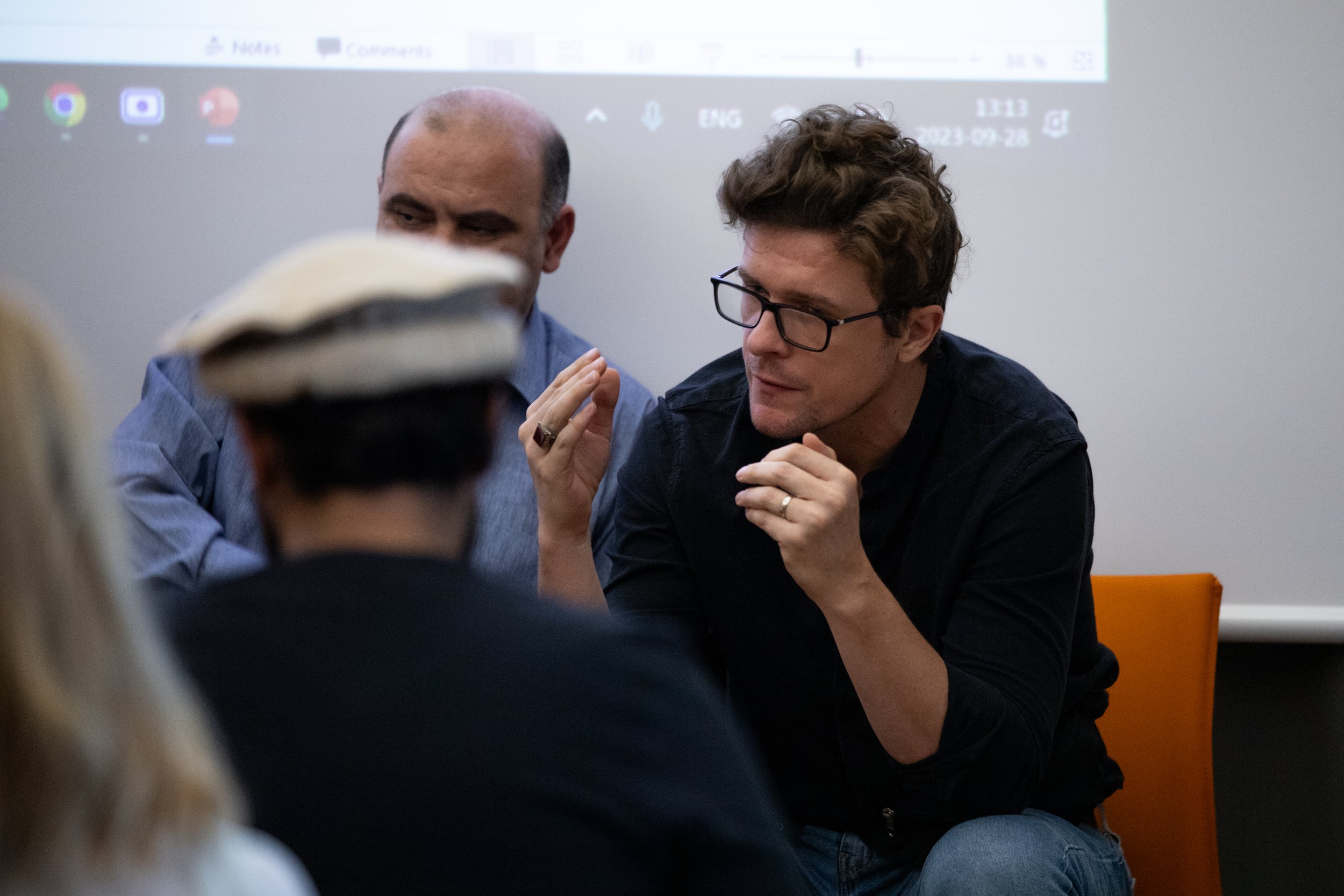Our book “Pathways to Agonism”: What can we learn from the DisTerrMem project?
The University of Bath’s Dr Christina Horvath, DisTerrMem Project Lead, and the University of Warsaw’s Dr Tomasz Rawski, Warsaw Team Lead, outline the exciting new book set to follow the completion of the DisTerrMem project.
From February 2019 to January 2024, the DisTerrMem project explored the shortcomings of modern nations’ often antagonistically structured memoryscapes. Contributors from the seven partner organisations collaborated on identifying and testing alternatives to both the antagonistic-nationalistic and cosmopolitan-transnational memory models. Drawing on the agonistic memory framework pioneered by Cento Bull and Hansen (2016), we adopted a practice-focused approach to agonism, seeking to identify and analyse examples of agonistic practices emerging from understudied regions outside Western Europe, in particular in North-East and Central Europe, the Caucasus, and South Asia, where the cosmopolitan memory model seemed less successfully established, and memoryscapes were still primarily dominated by antagonism.
We matured our reflections and refined our arguments through collaborative research and debates taking place in various project events, from the internal conferences in Bath in 2019 and in Warsaw in 2022 to the stakeholder workshops in December 2022 and the final international conference in Kaunas and Sejny in September 2023. Together, the project participants and further international researchers attracted by our events assessed the potential of the agonistic memory framework in these lesser-known contexts. We reached back to the original conceptualisation of agonistic democracy by Chantal Mouffe (2005, 2007, 2009, 2019) whose political philosophy inspired Cento Bull and Hansen. According to Mouffe’s radical ambition for artistic agonism, the main task of agonistic memory is not to create a new memory regime but to consistently reopen symbolic spaces, free them from the struggle for hegemony between antagonism and cosmopolitanism and help institutions and civil society actors imagine alternative, unprecedented, non-obvious ways of memorialising the most uncomfortable elements of the past. In other words, the purpose of agonism in the realm of memory is to create dissensus (Rancière 2015) to constantly transcend established rules and boundaries, desacralise and reshuffle patterns of memorialisation, in order to redefine their rules again and again. This undetermined movement towards new reconfigurations of the meanings of past events is essential for communities as this is precisely where the true potential of radical multi-perspectivity lies. Mouffe and Rancière concur in attributing to artists and cultural practitioners the most essential role in this process, by helping communities envision alternative ways of debating and reinterpreting the meaning of the past.
The project’s principal intellectual contribution has been summarised in the collective book “Pathways to Agonism: Managing the Memories of Disputed Territories”, forthcoming in Brill’s “Mobilizing Memories” series. The volume dedicates significant attention to cultural practitioners, alongside other important actors shaping regional, national and international memoryscapes: civil society groups, nation-state institutions and international organisations. It places agonistic memory theory within a broader, praxiological approach which recognises that, as suggested by Olick and Robbins (1998), memory is as a dynamic process characterised by continuous negotiations and clashes between competing visions of the past, for which the national frame was the main symbolic reference point.
The authors set out to explore the potentialities and limitations of an agonistic approach to memory by examining its use in different cultural and political contexts including state-promoted narratives transmitted through museum exhibitions, public commemorations, and school curricula, as well as alternative practices proposed by grassroots organisation using street art, citizen-initiated memory practices, theatre performances or participatory walking. The predominantly comparative case studies emerging from the project have been supplemented by contributions from external authors who attended the project’s final conference in September 2023. The research of these authors concentrated on agonistic forms of remembering in Central-Eastern Europe and the Balkans, with a particular emphasis on Austria and the former Yugoslavia. Through a range of case studies focusing on one or several contexts, the authors analysed and compared memory practices that adopted an agonistic framework in conflicted and post-conflict societies, seeking to assess to what extent the agonistic approach has contributed to overcoming overarching, hegemonic narratives by acknowledging the coexistence of overlapping and sometimes contrasting memories of the past and promoting radical multi-perspectivism and open-ended dialogue with the ‘Other’.
Dr Tomasz Rawski and Dr Christina Horvath at the DisTerrMem Conference in September 2023
The book’s principal aim is to test the potential and the limitations of an agonistic theoretical framework for memory, grounded in core concepts such as agonism, memory conflicts, and mnemonic wars. At the same time, it critically investigates the applicability and usefulness of this memory framework, particularly in the context of border regions which are marked by enduring conflicts over territory. In these context, cosmopolitan approaches are indispensable for the success of peacebuilding and peacekeeping attempts but a long-lasting peace might only be possible to achieve when the conflict is dialogically explored rather superficially superseded, and agonism might be useful to stage these crucial confrontations between adversaries recognising the democratic principles.
Addressing the recent resurgence of violent conflicts, it also explores how such conflicts influence contemporary approaches to remembering in contexts where national pasts are re-interpreted and institutionalised. It also investigates the role of practice-oriented methodological tools, such as memory mapping, oral history, arts-based and creative processes, post-humanist strategies of participatory walking, the Memory Grid Technic and bottom-up ethnographic research, in countering antagonistic practices in difficult contexts. The study further examines the intersections of cosmopolitan and agonistic memories at supranational, national, and local levels, exploring how different memory practices and configurations of mnemonic agents shape these intersections.
Finally, the volume assesses the perceived benefits and achievements of agonistic approaches developed by institutionalised and independent memory practitioners involved in managing competing memories of disputed territories with the aim of contributing to peacebuilding processes. Comparative exploration of commemorative strategies implemented in various contexts aims to evaluate their broader potential, considering the inclusion of agonism and how they modify local, national, and supra/transnational memoryscapes. Ultimately, the book seeks to develop models of agonistic engagement capable of breaking down antagonistic and mutually hostile modes of remembrance, encouraging more inclusive understandings of the past.
The most debated question among the contributors of the volume and the participants of the workshops, conferences and discussions hosted by the DisTerrMem project, concerned agonism’s potential to produce a shift towards more democratic memory practices in the examined regions. Overall, the authors seemed to agree that agonistic initiatives, even when they remain niche practices or are overshadowed by antagonism or entangled with cosmopolitanism, play a vital role in promoting critical self-reflection and the democratic contestation of discriminatory or non-representative dominant memory practices. By encouraging democratic values, including dialogue and horizontal relations between different groups both within a given society and across borders, they certainly enhance a much-needed shift towards democratic memoryscapes and continuous, active citizen engagement with past and present conflicts which are also crucial conditions for peacebuilding.
The editors, Christina Horvath (University of Bath) and Tomasz Rawski (University of Warsaw) look forward to presenting the volume at the Memory Studies Association’s Conference in Lima, Peru in July 2024.
Dr Christina Horvath (PhD Sorbonne Nouvelle 2003) joined the University of Bath in 2015. She has initiated and lead several international projects exploring colonial legacies, disputed memories, and urban marginality including Banlieue Network (2012-14), Co-Creation (coordinator of the Bath team 2017-2022), New Challenges on the Periphery (2022-23), Botanical Encounters (2021-23) and DisTerrMem (2022-24). Her latest book, Breaking the Dead Silence Engaging with the Legacies of Empire and Slave-Ownership in Bath and Bristol’s Memoryscapes (2024), co-edited with Dr Richard White, focuses on communities’ participation in shaping narratives about both cities’ links with transatlantic slavery after the toppling of Colston’s statue. For the Botanical encounters project, she brought together international scholars and Bath-based artists and activists to explore colonial legacies through participatory walks, art workshops, a talk series and an art exhibition focusing on plants. She is co-editor with Dr Tomasz Rawski of the book “Pathways for Agonism” (forthcoming with Brill), the book-length publication emerging from the DisTerrMem project.
Dr Tomasz Rawski (University of Warsaw project lead) is a political and cultural sociologist. He deals mainly with issues of nationalism, symbolic/memory politics and nation-/state-building in contemporary Eastern Europe, with particular emphasis on the former Yugoslavia, Poland and Russia. He has published a book on Bosniak symbolic strategies of nation-building in Bosnia and Herzegovina after 1995, as well as several articles on these topics. Tomasz has participated in several previous research projects focused on memory studies, including Horizon2020: REPAST. He has been a visiting scholar at University College London, Uppsala University and University of Sarajevo. Tomasz is Assistant Professor, Faculty of Sociology, Center for Research on Social Memory
References
Cento Bull, Anna, and Hans Lauge Hansen. 2016. “On agonistic memory”. Memory Studies 9(4): 390-404. https://doi.org/10.1177/1750698015615935
Cento Bull, Anna, Hans Lauge Hansen, and Francisco Colom-Gonzalez. 2021. “Agonistic memory revisited.” In Agonistic Memory and the Legacy of 20th Century Wars in Europe, edited by Stefan Berger and Wulf Kansteiner, 13-38. Palgrave Macmillan.
Cento Bull, Anna and Clarke, David. 2021. Agonistic interventions into public commemorative art: An innovative form of counter-memorial practice? Constellations.
Mouffe, Chantal. 2005. On the Political. Routledge.
Mouffe, Chantal. 2007. Artistic Activism and Agonistic Spaces. Art & Research, 1:2, Summer 2007.
Mouffe, Chantal. 2009. The Democratic Paradox. Verso.
Mouffe, Chantal. 2019. For a Left Populism. Verso. Nora, Pierre. 1989. “Between Memory and History: Les Lieux de Mémoire” Representations 26: 7-24. https://doi.org/10.2307/2928520
Olick, Jeffrey K., and Joyce Robbins. 1998. “Social Memory Studies: From ‘Collective Memory’ to the Historical Sociology of Mnemonic Practices”. Annual Review of Sociology, 24: 105-140. https://doi.org/10.1146/annurev.soc.24.1.105.
Rancière, Jacques. 2015. Dissensus: On Politics and Aesthetics. Bloomsbury Academic.
“This project has received funding from the European Union’s Horizon 2020 research and innovation programme under the Marie Skłodowska-Curie grant agreement No 823803”






